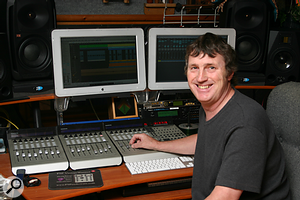We all want to make good music, but 'good' can be especially hard to define. Perhaps, then, we should replace 'good' with 'music that at least some section of the populace would like to hear'? On the other hand, it would be folly to say that the best music can be defined as being 'the music that the greatest number of people want to hear' — you only have to listen to the lowest-common-denominator tosh that spouts from radios and TVs to realise that. That said, I think it's fair to say that most composers want some of the public to like their music.
 The continually falling cost of technology has enabled almost all musicians to afford some kind of recording system of their own, but as most of us have discovered, working alone in the enclosed bubble of a studio isn't the ideal way to evaluate how your music will be received by the world at large. Asking friends and family for input isn't usually much help — either they are sick to death of hearing it, or they tell you what you want to hear. A friend of mine was offered very blunt advice by a record-company executive when he gave him a recording he had made saying that it warranted a release because everyone who'd heard it thought it was great, and should be made commercially available. The executive's response was to say that whenever somebody tells you how good your music is, you should ask them if they're prepared to invest in it. If they're not, their comments are of little worth. I don't know if I'd go so far as to subscribe to that view myself, but I can see where he was coming from — there's little risk for the musician, but a record label has to invest a huge amount of money in an artist.
The continually falling cost of technology has enabled almost all musicians to afford some kind of recording system of their own, but as most of us have discovered, working alone in the enclosed bubble of a studio isn't the ideal way to evaluate how your music will be received by the world at large. Asking friends and family for input isn't usually much help — either they are sick to death of hearing it, or they tell you what you want to hear. A friend of mine was offered very blunt advice by a record-company executive when he gave him a recording he had made saying that it warranted a release because everyone who'd heard it thought it was great, and should be made commercially available. The executive's response was to say that whenever somebody tells you how good your music is, you should ask them if they're prepared to invest in it. If they're not, their comments are of little worth. I don't know if I'd go so far as to subscribe to that view myself, but I can see where he was coming from — there's little risk for the musician, but a record label has to invest a huge amount of money in an artist.
A more practical way of seeing if your music has public appeal is to take it on the road and play it to the public. This could either be in the form of a live performance, or by having sample records made to play at clubs, if that's your potential market. It's surprising what you can learn by doing this. For a start, playing your music in front of an audience heightens your own sense of quality control, so if you find certain sections of your music (such as over-long intros and bridges) make you feel anxious, then perhaps they need more work. The other constant surprise is that the music you have lovingly crafted over the past six months often meets with almost total indifference, while the three-chord bash you wrote last night goes down a storm.
Alternatively, the Internet means that you can 'go live' without actually going anywhere or being live — it's simply a means to put your music before a greater number of people. However, the Internet is a big place, and is already awash with unsigned bands, so it's very hard to get anyone to even listen to your music, let alone buy it. Nevertheless, I feel that Internet radio technology combined with record/download sales offers a way forward. The technology already exists for Internet radio stations to set up multiple channels that can be sent to different listener groups based on information provided about their current listening habits. It follows then that those radio stations that can best optimise their programme material to individual listeners will get the biggest following, and if the listener can press a button for artist info, album listings and samples of other songs by an artist they like, they're more likely to press the 'Buy' button at the end of it. Sounds great, doesn't it — but who's going to finance all this in the first place?
This takes me back to the record-company executive who suggests asking people if they'd be happy to put money into your record, because if anybody should be prepared to make that commitment, it's you. Unsigned bands could pay a sensible amount of money to have their tracks added to a radio and record shop web site, so that the listening public really does get to decide whether their music is worth buying or not.
Paul White Editor In Chief
